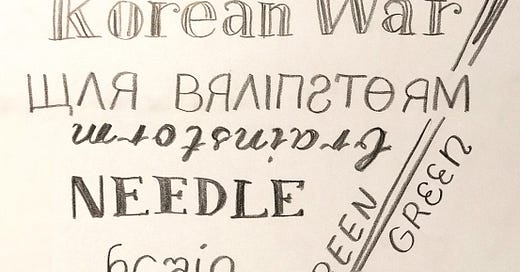Don't trust anything you hear
#08—Especially if it's in a noisy room and contains the words 'green needle'.
Welcome to Mind Flexing, your weekly thought expedition to everywhere and anywhere. Strap on your boots (or put your feet up), take a deep breath, and let’s get flexing.
Time passes. It passed while I was haphazardly working today, tap, tapping on the keyboard, putting words in their place, shifting an image 10 pixels up, or 50 pixels left, then 20 pixels back; then it passed again while I was cooking dinner, chirping with my children, gathering the washing, dashing down the back for bay leaves, bath time, book time, I don’t want to sleep time; and it passes now, the seconds ticking tirelessly away toward midnight. I see them, ticking, ticking in my head as it mildly throbs. They tick toward the turn of the new day, my promised deadline, and I’ve two hours and 23 minutes left of Wednesday. Twenty-two minutes.
It’s my mind flexing time, and if I were less disciplined, I would close my eyes. Time escaped me, as it so often does, and my tired brain will think only of fluffy clouds and fairy floss. I’m not sure I trust it tonight. I forgot to mention we’re out of chocolate, so I’ll go gently. And with that, the first fluffy flossy thing that comes to mind is a rather silly social media reel—I loathe them, try to avoid them, and get sucked in every time (which is why I so rarely venture on to social media these days and have instead started this Substack).
It’s of a man, Nathan Cox, a British content creator known as Coxy, lip-syncing songs, and quite deliberately getting the lyrics wrong as the incorrect words flash on the screen. What’s interesting about this is, despite knowing the right lyrics to these songs—for they are quite popular—we hear the mutilated version as clean and crisp as if they were never sung another way.
Let’s take a look at Coxy’s rendition of Carl Orff’s ‘O Fortuna’ from Carmina Burana, chosen because the lyrics are in Latin, which should assist me in my little experiment since most of us aren’t fluent in this archaic lingua. The lyrics, Wikipedia tells me, are taken from the collection of medieval poems Carmina Burana: Cantiones profanae cantoribus et choris cantandae comitantibus instrumentis atque imaginibus magicis, which translates to Songs of Beuern: Secular songs for singers and choruses to be sung together with instruments and magical images. How wonderful!
Just quickly though… in the time it has taken me to find this video and information, I’ve one hour and 53 minutes before midnight. Fabulously, however, I’m no longer tired. My mind has cranked up a gear. Now for the video—you’ll need to watch this with the sound on while reading the lyrics.
Did your brain do it too? Tell me it did. Tell me you heard this auditory illusion. Here’s one more for fun:
Turns out we can’t trust our ears. This has me thinking that our perception of the world is even more infinitesimal and unreliable than I’ve previously presented in my essays Flexible memories and I think I know precisely what you don’t mean. In those essays, I showed how we fail to visually perceive most of what occurs in the world around us due to inattentional blindness, and we are left to create our own meaning from the information we interpret. Come to think of it, much of what I have been writing about has subconsciously (until this very moment) been about what we don’t know or how we fail to understand. I suspect it’s my way of rationalising the pains of this world.
So what causes auditory illusions? Dr Lars Riecke from the Department of Cognitive Neuroscience at Maastricht University in The Netherlands told ScienceDaily:
"In our day-to-day lives, sounds we wish to pay attention to may be distorted or masked by background noise, which means that some of the information gets lost. In spite of this, our brains manage to fill in the information gaps, giving us an overall 'image' of the sound."
In other words, the brain makes things up to make sense of the incomplete information it has received. The brain feeds us the sensical version and we’re none the wiser of the nonsense we truly heard.
There is a plus side to all this. Dr Riecke’s research found that:
“It is relatively common for listeners to "hear" sounds that are not really there. In fact, it is the brain's ability to reconstruct fragmented sounds that allows us to successfully carry on a conversation in a noisy room.”
All well and good, but my brain really needs to try harder because I was thoroughly confused by a reference a cousin of mine made to the Korean War during a conversation distorted by loud music at the weekend. When I, innocently, passed this information on to my husband, who likes his war history, he had himself a good laugh. Turns out I was supposed to be talking about the war in Ukraine.
Thank you for Mind Flexing with me. If you enjoyed this essay, please subscribe, comment below, show some ❤️, or help me get this new publication off the ground by sharing it with someone you think would appreciate it.
I’ll be back next week. Until then, keep 💪.






You’re making me question everything !!! lol